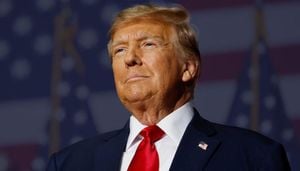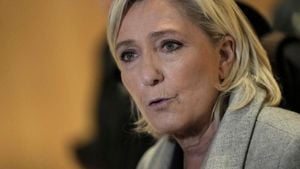Keir Starmer faces mounting pressure to strengthen his post-Brexit approach to relations with the European Union, following increasing warnings about the UK's economic struggles stemming from its exit from the bloc. The call for action follows notable comments from Andrew Bailey, the Governor of the Bank of England, who emphasized the importance of rebuilding the UK's trading relationship with Europe, citing lasting damage to exports. He described the current economic situation as stagnant, raising concerns over how Brexit repercussions have significantly weighed down Britain's economic performance.
At the annual Mansion House dinner, Bailey suggested to key business figures the necessity of deepening the trading ties with the EU, highlighting how the consequences of Brexit are still evident. Barry's comments come as the latest data reveals the economy has been flatlining, which is particularly pressing just as the Labour government tries to regain public confidence following its recent ascension to power.
Echoing these sentiments, former national security adviser Lord Ricketts expressed concerns over the need for Starmer's government to convey solid plans for resetting relations. Speaking with The Independent, he noted, "My European friends appreciate the government’s efforts to improve the tone and rebuild personal contacts, but they are becoming increasingly impatient for real progress and substance. Once the new European Commission is formed, details will be necessary to maintain momentum." This urgency suggests there’s little time to waste if Starmer wants to capitalize on the initial goodwill exhibited by Europe.
Pro-EU campaign group Best for Britain’s Naomi Smith noted the urgency for the Labour government to present clear goals for the relationship reset, especially since European priorities are beginning to shift following the U.S. elections. She advocated for addressing barriers to trade, particularly through regulatory alignments, to facilitate quicker economic recovery. “The EU is interested in agreements like the Youth Mobility Scheme and enhanced defense cooperation, and our government should actively articulate our expectations for the future," Smith commented.
Further complicting matters, Joe Meighan from the European Movement UK highlighted the potential rewards of collaboration now more than ever. He stated, “It’s imperative for both the UK and the EU to work together as close partners in this new era of cooperation. This requires proactive efforts and negotiations.” Starmer has made commitments to repair the damaged UK-EU relationship, which had suffered greatly during the Brexit campaign, and he has initiated several measures displaying cooperation, including recent defense agreements, particularly with Germany.
Nevertheless, some critics argue Starmer’s ambitions are vague, especially after he declined Brussels’ proposal on free movement for young people, which has left doubts about his long-term vision. Supporters like Bailey are careful to note the lasting adverse effects of Brexit, particularly on goods rather than services, reiteratively warning of the importance of vigilance and open discussions to recover positive ties with Europe.
Meanwhile, Starmer has found himself under pressure not only domestically but also internationally, especially considering statements from the incoming Trump administration. Just this week, Stephen Moore, one of Trump’s senior economic aides, outright challenged the UK to choose between favoring the US or maintaining ties with the "socialist" EU. He suggested the UK could face potential tariffs if it pursues closer EU relations, effectively attempting to steer Starmer's government away from its existing plans. Chancellor Rachel Reeves has fiercely rebuffed this, insisting the focus should remain on the lucrative EU market, which remains Britain's largest export destination.
Despite pressure from the U.S., many economists, including Molly Scott Cato from the European Movement UK, insist on not capitulating to such tactics. She reminded The Independent of the significant economic benefits tied to embracing stronger cooperations with Europe and underscored the necessity for practical steps to mitigate trade scars left by Brexit. “There are actionable initiatives to lower trade burdens, like establishing veterinary agreements, which would ease border checks and lower complications," Scott Cato said, stressing the pragmatic approach needed to navigate the current situation.
The rhetoric warning Starmer against complacency is intensifying as more voices surface advocating for the necessity of thorough plans for post-Brexit infrastructure. Reeves' determination to push for favorable terms with both Europe and the U.S. suggests an underlying tension within Labour's foreign policy strategies.
The Labour party is at such a juncture where failing to clearly define its stance and actively pursue the restoration of trading ties with Europe could result not just in disappointment from European allies but also significant backlash from within the party. Analysts are closely monitoring how Starmer’s government negotiates these complex international relationships moving forward, especially as Trump’s administration looms closer, promising to reshape the geopolitical chessboard once again.
With Brexit reshaping international relations, diversifying engagements away from one dominant partner could become increasingly pronounced. Starmer's approach to balancing the shaky transatlantic relations with the U.S. against the precarious EU relationship is trending on thin ice, and how he chooses to navigate these waters will very likely define not just his tenure but the economic viability of the UK as it moves beyond Brexit.
For now, the clock is ticking as stakeholders await tangible solutions from the Labour leadership. How Keir Starmer responds to both domestic pressures and international challenges will prove pivotal for Britain's future on the world stage.



